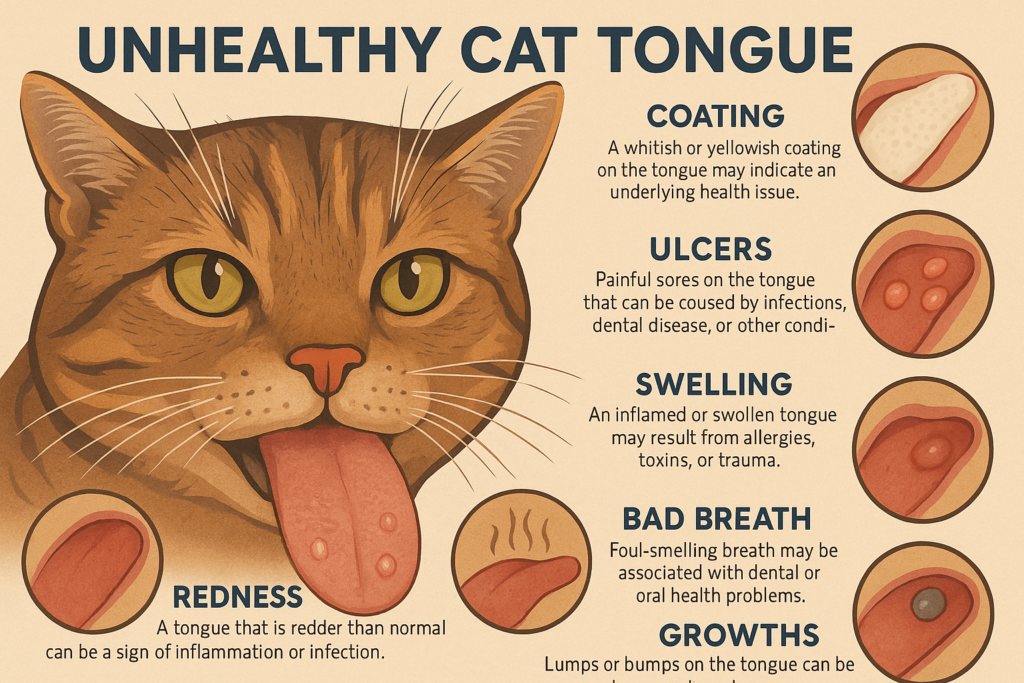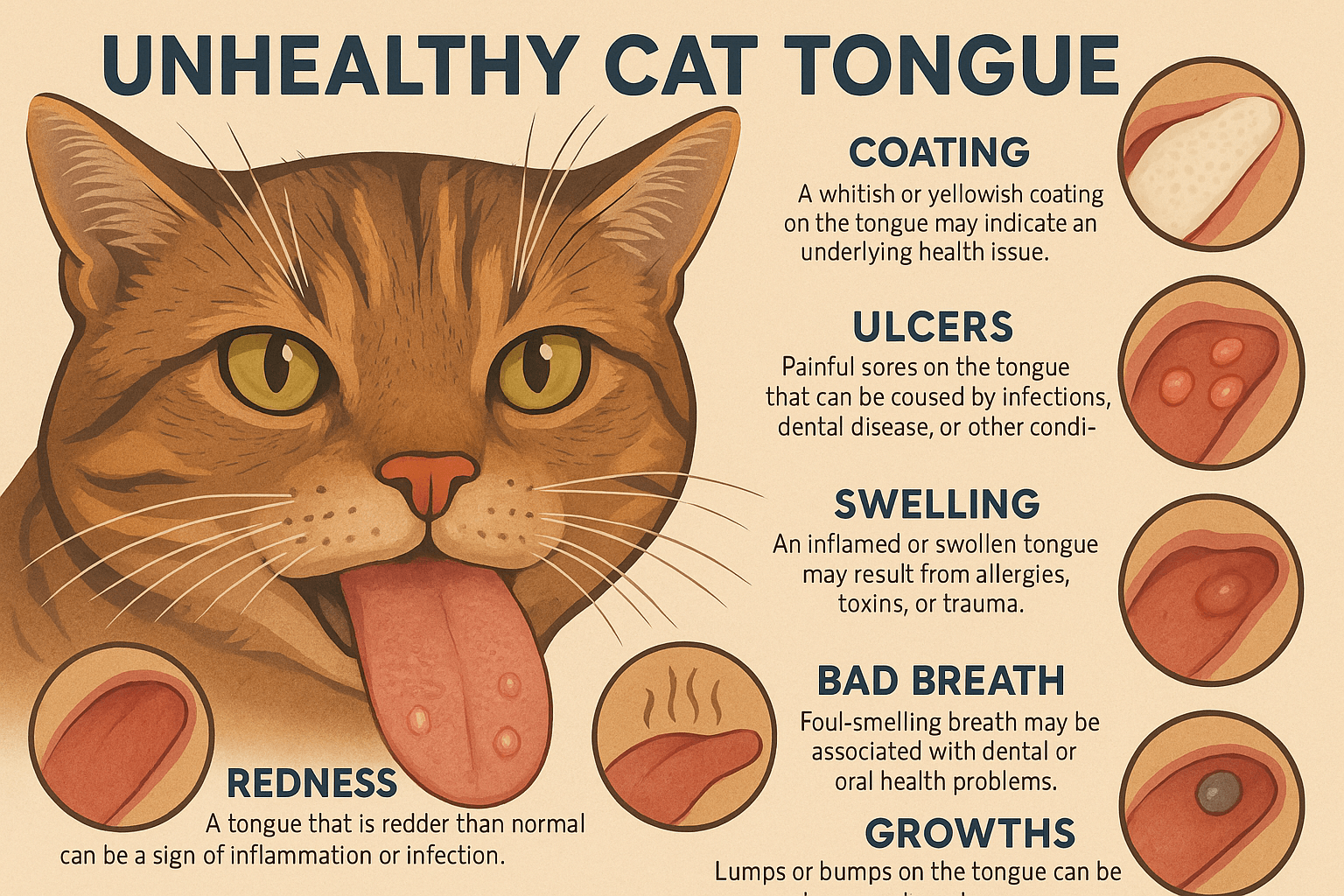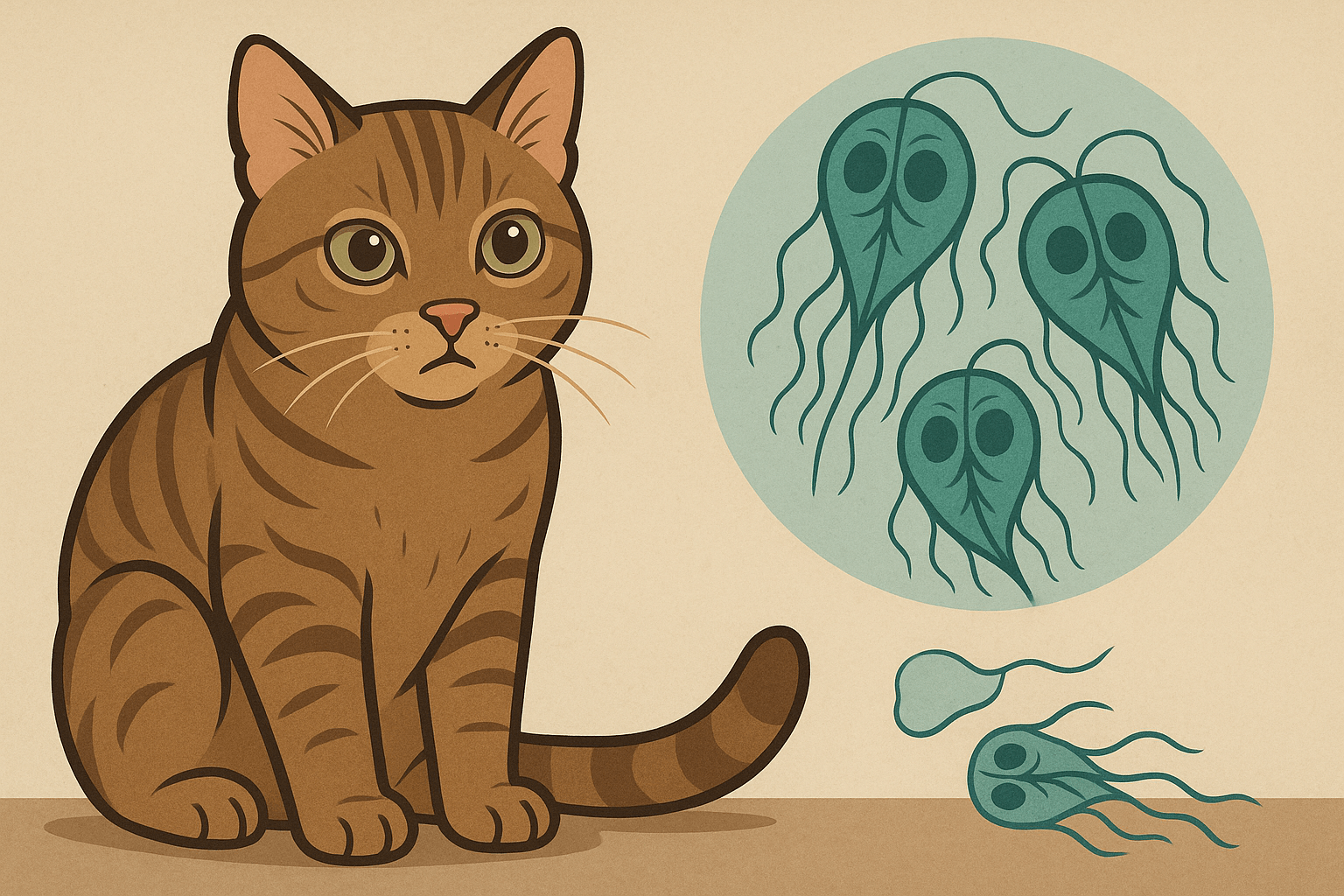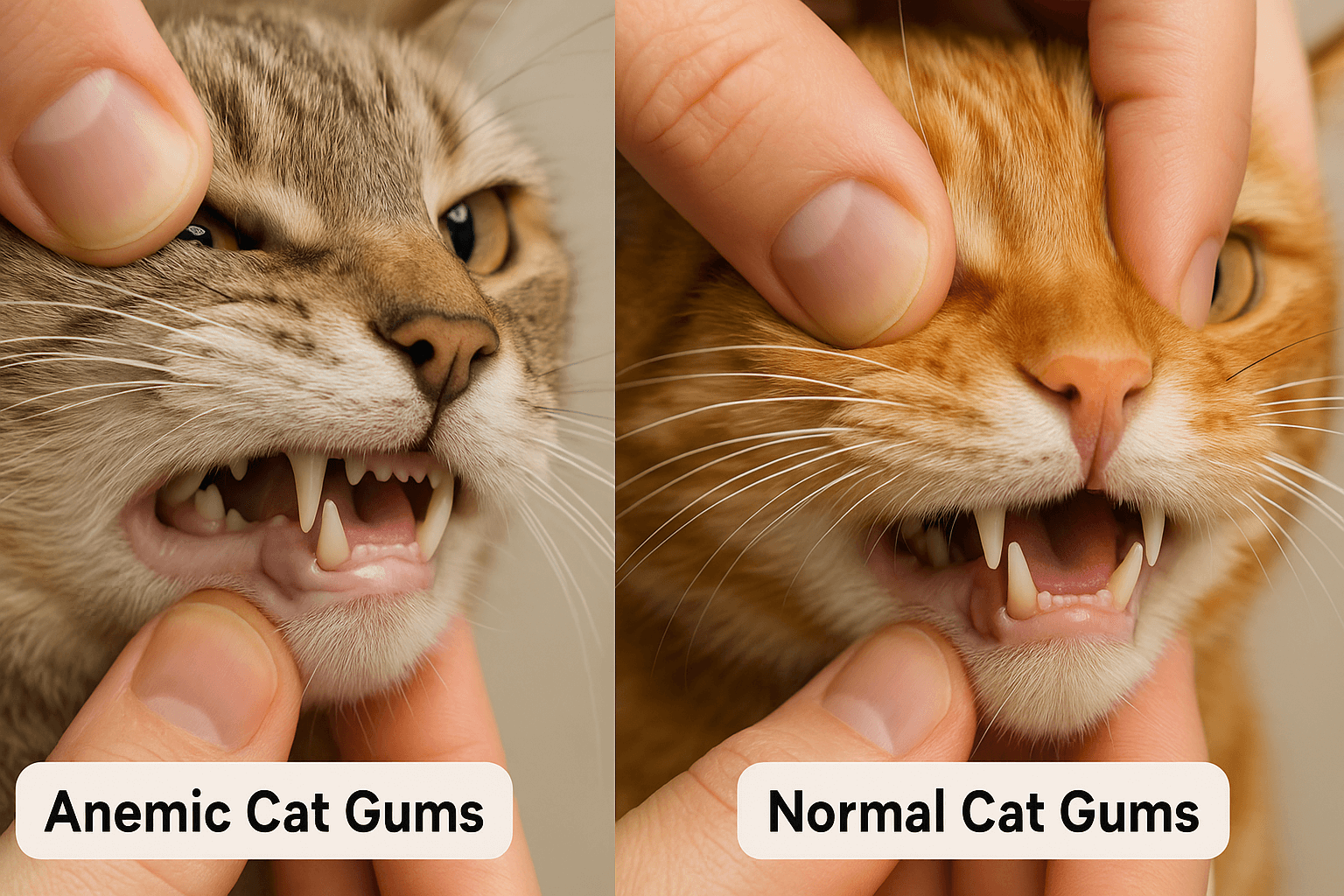Unhealthy Cat Tongue: What Every Cat Owner Should Know
A cat’s tongue is one of its most fascinating features, covered in tiny, backward-facing barbs called papillae that help them groom, eat, and even drink water efficiently. However, an unhealthy cat tongue can signal underlying health issues that should not be ignored. From discoloration to unusual textures or behaviors, changes in your cat’s tongue can provide valuable clues about their overall well-being. Understanding the signs of an unhealthy tongue and knowing how to address them is essential for keeping your feline friend healthy and happy. In this guide, we’ll explore everything you need to know about identifying, preventing, and treating problems related to your cat’s tongue.
Expert Insight: The Importance of Grooming for Cats
“When cats groom they are improving circulation under the skin, helping to regulate temperature, and distributing natural conditioning oils to keep fur healthy and shiny.”
Signs of an Unhealthy Cat Tongue
Recognizing the symptoms of an unhealthy cat tongue is the first step toward addressing potential health concerns. Keep an eye out for these common warning signs that may indicate something is wrong.
Discoloration:
A healthy cat’s tongue should be pink. If it appears pale, red, or has spots of unusual color, it could indicate anemia, infection, or other conditions.Swelling or Inflammation:
Swollen areas on the tongue may suggest trauma, allergies, or infections like gingivitis.Ulcers or Sores:
Open sores or ulcers can be painful and may result from viral infections, nutritional deficiencies, or foreign objects.Excessive Drooling:
While some drooling is normal during purring, excessive saliva can point to pain, irritation, or dental issues.Changes in Texture:
A rough or overly smooth tongue might indicate dehydration, vitamin deficiencies, or systemic illnesses.
If you notice any of these signs, it’s important to consult your veterinarian promptly to determine the underlying cause and begin treatment.

Common Causes of an Unhealthy Cat Tongue
Several factors can contribute to an unhealthy cat tongue, ranging from minor irritations to serious medical conditions. Identifying the root cause is key to effective treatment.
Dental Disease:
Periodontal disease or tooth decay can lead to inflammation and discomfort in the mouth, affecting the tongue as well.Viral Infections:
Feline calicivirus and feline herpesvirus are common culprits behind oral ulcers and tongue lesions.Nutritional Deficiencies:
Lack of essential vitamins and minerals, such as B vitamins or iron, can manifest as tongue abnormalities.Allergies or Irritants:
Exposure to certain foods, plants, or chemicals may cause allergic reactions that affect the tongue.Trauma or Injury:
Accidental bites, burns, or foreign objects lodged in the mouth can damage the tongue and surrounding tissues.
Understanding these causes helps you take preventive measures and seek timely veterinary care when needed.
Check this guide 👉Why Are Cats Tongues So Rough? Best 7 Expert Tips!
Check this guide 👉Cat Coughing with Tongue Out: Best 7 Health Tips!
Check this guide 👉Why Does My Cat Stick the Tip of His Tongue Out? Best 7 Tips
Signs of a Healthy Cat Tongue | Signs of an Unhealthy Cat Tongue |
|---|---|
Pink and moist appearance | Pale, red, or discolored tongue |
Smooth texture with visible papillae | Rough, cracked, or overly smooth surface |
No visible sores or ulcers | Presence of ulcers or open wounds |
Minimal drooling | Excessive drooling |
No swelling or inflammation | Swollen or inflamed areas |
How to Prevent an Unhealthy Cat Tongue
Prevention is always better than cure when it comes to your cat’s health. These proactive steps can help maintain a healthy tongue and reduce the risk of problems.
Regular Dental Care:
Brush your cat’s teeth regularly using pet-safe toothpaste to prevent plaque buildup and gum disease.Balanced Diet:
Feed your cat high-quality food rich in essential nutrients to support overall oral health.Routine Vet Check-Ups:
Schedule annual dental exams to catch early signs of tongue or mouth issues before they worsen.Monitor Behavior:
Watch for changes in eating habits, grooming routines, or excessive pawing at the mouth.Safe Environment:
Keep harmful substances, toxic plants, and small objects out of reach to avoid accidental ingestion or injury.
By incorporating these practices into your routine, you can significantly lower the chances of your cat developing tongue-related problems.
Treatment Options for an Unhealthy Cat Tongue
If your cat’s tongue shows signs of illness, prompt treatment is crucial to restore their comfort and health. Here are some common approaches veterinarians may recommend.
Antibiotics or Antivirals:
Medications may be prescribed to treat bacterial or viral infections causing tongue issues.Pain Management:
Pain relievers can help alleviate discomfort while the underlying condition is being addressed.Nutritional Supplements:
Adding vitamins or minerals to your cat’s diet can correct deficiencies contributing to tongue problems.Dental Cleaning:
Professional cleanings remove tartar and plaque that could irritate the tongue and gums.Surgery (in Severe Cases):
In rare instances, surgical intervention may be necessary to remove tumors, repair injuries, or address severe deformities.
Each treatment plan depends on the specific diagnosis, so always follow your vet’s guidance for the best outcome.
Additional Symptoms to Watch For
In addition to the primary signs of an unhealthy cat tongue, there are other subtle symptoms that may indicate a problem. Being aware of these can help you act quickly.
Bad Breath:
Persistent foul odor from the mouth may signal dental disease or infections affecting the tongue.Difficulty Eating:
Reluctance to eat or dropping food could mean pain or discomfort in the tongue or mouth.Licking Objects Obsessively:
Excessive licking of toys, furniture, or floors might suggest irritation or an attempt to self-soothe.Weight Loss:
Sudden weight loss can occur if oral pain prevents your cat from eating properly.Behavioral Changes:
Increased aggression, hiding, or lethargy may accompany oral health issues.
Paying attention to these additional symptoms ensures you don’t overlook potential problems.
Home Remedies for Mild Tongue Issues
For minor tongue irritations, home remedies can offer temporary relief until you see a vet. Always confirm with your veterinarian before trying these methods.
Saltwater Rinse:
Mix a diluted saltwater solution to gently clean the area around the mouth. Do not force your cat to swallow it.Soft Foods:
Switch to soft, wet food to reduce strain on the tongue and make eating easier.Hydration Boosters:
Encourage water intake by offering fresh water frequently or using a pet water fountain.Ice Cubes:
Small ice cubes can numb mild inflammation and provide soothing relief.Avoid Irritating Foods:
Temporarily eliminate spicy, salty, or hard foods that might aggravate the tongue.
While helpful, these remedies are not substitutes for professional care in severe cases.
When to Seek Emergency Veterinary Care
Some tongue-related issues require immediate attention to prevent further complications. Knowing when to seek emergency care can save your cat’s life.
Severe Bleeding:
Significant blood loss from the tongue requires urgent treatment to stop the bleeding and prevent infection.Difficulty Breathing:
Swelling or blockages affecting the tongue can compromise your cat’s airway, necessitating immediate intervention.Foreign Object Lodged:
If your cat has something stuck in their mouth or throat, do not attempt removal yourself—seek professional help.Sudden Collapse:
Weakness, fainting, or collapse alongside tongue issues could indicate a systemic emergency.Seizures or Neurological Symptoms:
Unusual behavior combined with tongue abnormalities may signal neurological problems requiring urgent diagnosis.
Acting swiftly in emergencies ensures your cat receives the care they need to recover safely.
Frequently Asked Questions About an Unhealthy Cat Tongue
What does a healthy cat tongue look like?
A healthy cat tongue is pink, moist, and covered in tiny barbs called papillae.
Why is my cat’s tongue swollen?
Swelling can result from trauma, infections, or allergic reactions. Consult your vet for proper diagnosis.
Can poor nutrition affect my cat’s tongue?
Yes, deficiencies in vitamins or minerals can lead to tongue abnormalities. Ensure a balanced diet for optimal health.
Is excessive drooling normal for cats?
Some drooling is normal during purring, but excessive drooling often indicates oral pain or irritation.
How often should I check my cat’s mouth?
Regularly inspect your cat’s mouth weekly and schedule annual vet visits for professional evaluation.
Prioritizing Your Cat’s Oral Health
An unhealthy cat tongue is more than just a cosmetic concern—it’s a window into your cat’s overall health. By staying vigilant, practicing good oral hygiene, and seeking veterinary care when needed, you can ensure your feline companion enjoys a comfortable and happy life. Remember, early detection and prevention are key to avoiding complications. With love, attention, and the right care, your cat’s tongue will remain a vital tool for their unique behaviors and communication.
Giardia in Cats: Best 7 Expert Tips! Discover expert advice on identifying, treating, and preventing giardia in cats to ensure your feline stays happy and healthy.
Cat Hyperventilating: Best 7 Expert Tips! Discover signs, causes, and solutions for cat hyperventilation. Learn how to calm your cat and when to seek veterinary care for their breathing issues.
Anemic Cat Gums vs Normal: Best 7 Expert Tips! Learn to spot signs of anemia in cats, understand gum health, and ensure your feline stays happy and healthy with expert advice.
Himalayan Cat Size: Best 7 Expert Tips! Discover expert advice on Himalayan cat size, growth factors, care tips, and how to ensure your feline stays healthy and happy.





